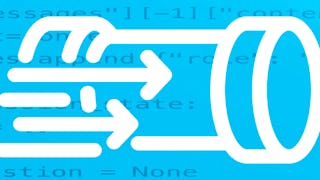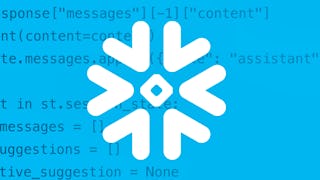This is a technical, hands-on course that teaches you how to implement DevOps best practices to build data pipelines, and how to implement observability to maintain and monitor data pipeline health. The course focuses on the most practical Snowflake concepts, features, and tools to get you up and running quickly with these concepts.



Advanced Data Engineering with Snowflake
This course is part of Snowflake Data Engineering Professional Certificate

Instructor: Snowflake Northstar
Top Instructor
Included with 
Recommended experience
What you'll learn
How to implement DevOps best practices for data pipelines with Snowflake
How to implement observability to monitor data pipeline health
Skills you'll gain
Details to know

Add to your LinkedIn profile
May 2025
3 assignments
See how employees at top companies are mastering in-demand skills

Build your Software Development expertise
- Learn new concepts from industry experts
- Gain a foundational understanding of a subject or tool
- Develop job-relevant skills with hands-on projects
- Earn a shareable career certificate from Snowflake

There are 2 modules in this course
In this module, you'll understand how DevOps helps software development teams iterate safely and efficiently, and understand how those practices can be applied in the field of data engineering. You'll learn how to implement a few key DevOps best practices for data pipelines. Namely, you'll learn how to implement source control for pipeline objects, how to declaratively manage database objects, and how to introduce changes to dedicated data development environments using continuous integration. By the end of the module, you'll understand how data pipelines can be built collaboratively by large teams, and how they can be evolved efficiently and reliably.
What's included
12 videos5 readings1 assignment
In this module, you'll learn about observability, and how it can be implemented to monitor the health and performance of data pipelines. You'll specifically learn about Snowflake's observability framework, Snowflake Trail, and how to implement its core components. You'll use event tables, logs, and traces to implement detailed records of events occurring within your data pipeline. You'll also learn how to generate alerts to detect specific conditions in your data environment, and how to combine them with notifications to communicate information to key stakeholders, like a broader data engineering team.
What's included
11 videos3 readings2 assignments
Earn a career certificate
Add this credential to your LinkedIn profile, resume, or CV. Share it on social media and in your performance review.
Instructor

Offered by
Explore more from Software Development
 Status: Free Trial
Status: Free Trial Status: Free Trial
Status: Free Trial Status: Free Trial
Status: Free TrialDuke University
Why people choose Coursera for their career





Open new doors with Coursera Plus
Unlimited access to 10,000+ world-class courses, hands-on projects, and job-ready certificate programs - all included in your subscription
Advance your career with an online degree
Earn a degree from world-class universities - 100% online
Join over 3,400 global companies that choose Coursera for Business
Upskill your employees to excel in the digital economy
Frequently asked questions
To access the course materials, assignments and to earn a Certificate, you will need to purchase the Certificate experience when you enroll in a course. You can try a Free Trial instead, or apply for Financial Aid. The course may offer 'Full Course, No Certificate' instead. This option lets you see all course materials, submit required assessments, and get a final grade. This also means that you will not be able to purchase a Certificate experience.
When you enroll in the course, you get access to all of the courses in the Certificate, and you earn a certificate when you complete the work. Your electronic Certificate will be added to your Accomplishments page - from there, you can print your Certificate or add it to your LinkedIn profile.
If you subscribed, you get a 7-day free trial during which you can cancel at no penalty. After that, we don’t give refunds, but you can cancel your subscription at any time. See our full refund policy.
More questions
Financial aid available,


